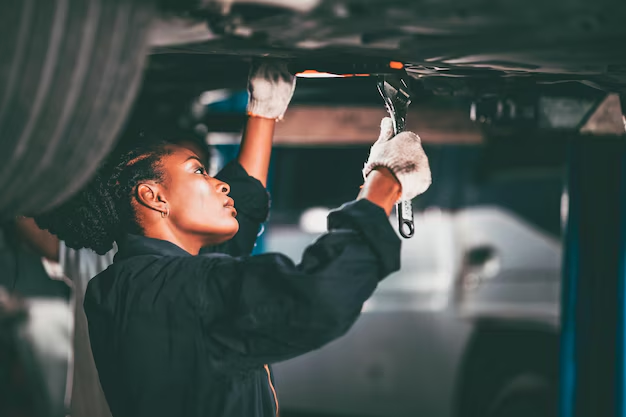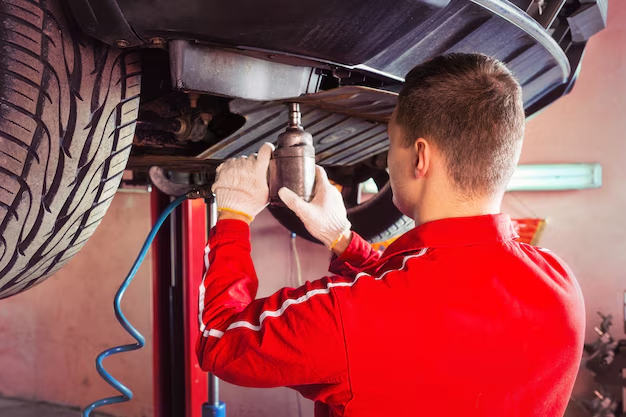When you think about what makes your car comfortable and safe, you might consider seatbelts, airbags, or maybe even the quality of your tires. But there’s one system quietly doing its job every time you drive, keeping your ride smooth, stable, and controlled. It’s your car’s suspension system, and it’s far more important than most people realize.
The suspension system doesn’t just make your commute more comfortable; it’s a critical part of your vehicle’s safety. It keeps your tires firmly in contact with the road, helps maintain control when turning or braking, and absorbs the bumps, dips, and potholes that are part of everyday driving. Without a well-functioning suspension, you’re looking at a ride that’s not only uncomfortable but potentially dangerous.
At North Atlanta Automotive in Peachtree Corners, GA, we’ve seen firsthand how suspension issues can sneak up on drivers. By understanding how your suspension works and the warning signs that it might need attention, you can protect your comfort, safety, and your wallet.

What Does the Suspension System Do?
Your suspension system is a network of springs, shock absorbers (or struts), control arms, bushings, and linkages that work together to balance comfort and control.
It has two main jobs:
- Absorb road impact – When you hit a bump or pothole, the suspension takes the hit so you don’t feel every jolt directly in your seat.
- Maintain tire contact with the road – Even on uneven surfaces, your suspension keeps all four tires planted firmly, so your brakes and steering can work properly.
Without this system, every road imperfection would shake your car violently, and you’d have far less control over your vehicle, especially during sudden stops or quick maneuvers.
Comfort and Safety: A Delicate Balance
Automotive engineers design suspension systems to provide both a smooth ride and precise handling. This is tricky because too much comfort can lead to a “floaty” feel that reduces control, while too much stiffness makes for a jarring ride.
A healthy suspension system strikes the perfect middle ground—absorbing shocks while keeping your car stable, predictable, and responsive. That’s why suspension repair isn’t just about fixing a rough ride; it’s about ensuring your vehicle is performing as safely as it should.
Why Suspension Health Is a Safety Issue
When suspension parts wear out, it’s not just a matter of bouncing a little more than usual—it can affect how your car stops, turns, and handles in emergencies.
Here’s how a failing suspension can put you at risk:
- Longer stopping distances – Worn shocks or struts make it harder for your tires to maintain consistent contact with the road, especially during hard braking.
- Poor stability in turns – A failing suspension can cause excessive body roll, making it harder to control your vehicle during cornering.
- Uneven tire wear – Bad suspension components can cause tires to wear prematurely or unevenly, reducing traction and increasing the risk of blowouts.
- Loss of control on rough roads – When the suspension can’t keep up with bumps and dips, your car can bounce, sway, or even drift unexpectedly.
In short, when your suspension struggles, your safety is compromised.
Common Signs Your Suspension Needs Attention
Suspension wear happens gradually, so drivers often adapt to the changes without realizing there’s a problem. Here are some clear signs you should never ignore:
- Your car rides rougher than it used to – Feeling every bump in the road is a classic sign that your shocks or struts are wearing out.
- Pulling or drifting when turning – This could mean worn suspension parts are affecting stability.
- Uneven tire wear – If one tire is wearing faster than the others, your suspension may not be holding the wheels at the correct angles.
- Nose-diving when braking – If the front of your car dips excessively when you brake, the shocks may not be doing their job.
- Oily or damaged shocks – If you see grease or oil on your shock absorbers, it likely means they’re leaking and need replacement.
- Leaning to one side – If your vehicle seems to sag or tilt, a spring could be broken or worn.
If you notice any of these symptoms, it’s best to have a certified mechanic inspect your suspension promptly before the problem worsens.
What Causes Suspension Wear?
Even with careful driving, your suspension takes a beating over time. Common culprits include:
- Potholes and rough roads – Every jolt and bump puts stress on springs, shocks, and other components.
- Heavy loads – Regularly carrying extra weight accelerates suspension wear.
- Driving habits – Aggressive braking, fast cornering, and sudden stops wear parts out faster.
- Age and mileage – Over time, metal parts fatigue and rubber bushings crack or deteriorate.
In Peachtree Corners and the surrounding Georgia roads, drivers often deal with a mix of city streets, suburban routes, and occasional highway construction zones—all of which can speed up wear and tear.
How Suspension Repairs Work
Suspension repair isn’t a one-size-fits-all process. Depending on what’s worn or damaged, it might involve:
- Replacing shocks or struts – Restores smooth ride and proper handling.
- Installing new springs – Corrects sagging and restores vehicle height.
- Replacing bushings – Reduces vibration and keeps components properly aligned.
- Fixing control arms or ball joints – Improves steering precision and stability.
- Wheel alignment – Ensures tires track straight and wear evenly after repairs.
At North Atlanta Automotive, we take a careful approach. Because our technicians are salaried—not commission-based—you’ll only get recommendations for what’s truly needed, with no pressure for unnecessary add-ons.
Maintaining Your Suspension for the Long Haul
While suspension parts will eventually need replacement, you can extend their lifespan with smart vehicle care:
- Avoid potholes when possible – Even one big hit can cause damage.
- Drive at safe speeds over bumps – Slow down on rough terrain to reduce impact.
- Don’t overload your vehicle – Follow your manufacturer’s weight limits.
- Get regular inspections – A mechanic can spot early wear before it becomes a safety hazard.
- Replace tires when needed – Worn tires reduce suspension efficiency and handling.
Pairing these habits with routine maintenance will help keep your ride both comfortable and safe.
Why Trust North Atlanta Automotive with Suspension Repairs?
We know you have choices when it comes to auto repair in Peachtree Corners. But here’s why our customers trust us:
- Honest & transparent service – No upselling, no inflated estimates, just straightforward advice.
- Experienced technicians – Our team has decades of combined experience, with some working together for nearly 20 years.
- Fair pricing – We believe in making a living, not a killing.
- Flexible financing – With Snap Finance and Easy Pay Finance, you can spread the cost over time without the stress
Whether your vehicle needs routine car maintenance or major suspension repair, we’ll make sure you leave with a car that’s safe, stable, and comfortable to drive.
A smooth, stable ride isn’t just a luxury—it’s a necessity for safety. If your car is bouncing, swaying, or just not handling like it used to, it’s time to take action. Schedule a suspension inspection with North Atlanta Automotive today, and let our trusted team help you get back to driving with confidence.

